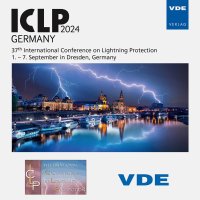On the continuing current duration of negative downward lightning measured in different regions
Conference: ICLP 2024 - 37th International Conference on Lightning Protection
09/01/2024 - 09/07/2024 at Dresden, Germany
Proceedings: ICLP Germany 2024
Pages: 6Language: englishTyp: PDF
Authors:
Kereszy, Istvan; Kereszy, Tamas; Kern, John; Pedro, Giovanna; Comeau, Caroline; Victorino, Paulo; Fuzy, Dorottya; Pomazi, Krisztian; Bartos, Imre; Guimaraes, Miguel; Simoes, Listz; Teixeira, Karine; Barbosa, Gustavo; Guimaraes, Lucas; Drumond, Matheus; Arcanjo, Marcelo; Bryant, Colleen; Yebra, Marta; Zhao, Li; Cary, Geoff; Boer, Matthias; Nolan, Rachael; Lawrey, Ryan; Milner, Ailish; Leavesley, Adam; Jenkins, Meaghan
Abstract:
This paper presents a statistical study on the duration of negative downward lightning continuing current, using electric field waveforms recorded by a novel network deployed in three different regions: Central Florida (USA), Australian Capital Territory – ACT (Australia), and Minas Gerais (Brazil). Over 600 waveforms were analyzed, and the mean dura-tions of the continuing current for Florida, ACT, and MG were found to be 142 ms, 122 ms, and 130 ms, respectively. The datasets were successfully fitted with lognormal distributions, and the parameters are detailed throughout the text. This paper highlights the important application of studying long-continuing-current events that are much longer than the 40 ms threshold, since they are the principal causes of lightning-ignited wildfires and lightning-caused power outages. One key finding of this study is that lightning can be classified into two distinct groups: (1) short lightning strikes with return stroke duration on the order of 100 mus that do not contain any continuing current and (2) long-continuing-current lightning with average durations that are a thousand times longer than those in the first group.


